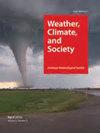构建洛杉矶大都会的洪水风险和洪水管理问题
IF 1.9
4区 地球科学
Q3 ENVIRONMENTAL STUDIES
引用次数: 0
摘要
本文发展了洪水问题框架的概念,以了解决策者在加州洛杉矶大都会区洪水风险管理中的优先事项。问题框架塑造了个人对特定管理策略及其未来行为的偏好。虽然洪水是一个复杂的、多方面的问题,有多种原因和多种影响,但决策者最有可能只管理他们意识到或关心的洪水方面。为了评估洪水决策者对洛杉矶地铁洪水暴露、脆弱性和管理的主要关注,我们邀请了防洪区、城市规划者、非营利组织和其他洪水相关决策者组成的焦点小组。我们发现了许多问题,包括对特定类型洪水(如河流洪水与洪泛洪水)的担忧,以及对不同基础设施和社区的影响。我们的分析表明,洪水问题共分为三个问题框架:一个是气候变化加剧的大型河流洪水及其对住房、经济和基础设施的影响;一个关注洪泛、污染和社区历史性投资不足;以及一个关注沿海和河流洪水对生态系统的影响。虽然每个人通常都会表达只与一个问题框架重叠的担忧,但每个问题框架都由许多组织类型进行了讨论,这表明洪水规划和应对中跨组织协调的障碍很低。本文还促进了我们对一个不面临频繁大洪水的地区的洪水风险感知的理解。本文章由计算机程序翻译,如有差异,请以英文原文为准。
Framing the Problem of Flood Risk and Flood Management in Metropolitan Los Angeles
This paper develops the concept of flood problem framing to understand decision-makers’ priorities in flood risk management in the Los Angeles Metropolitan Region, California. Problem frames shape an individual’s preferences for particular management strategies and their future behaviors. While flooding is a complex, multifaceted problem, with multiple causes and multiple impacts, a decision-maker is most likely to manage only those dimensions of flooding about which they are aware or concerned. To evaluate flood decision-makers’ primary concerns related to flood exposure, vulnerability, and management in the LA Metro, we draw on focus groups with flood control districts, city planners, nonprofit organizations, and other flood-related decision makers. We identify numerous concerns, including concerns about specific types of floods (e.g., fluvial versus pluvial) and impacts to diverse infrastructure and communities. Our analyses demonstrate that flood concerns aggregate into three problem frames: one concerned with large fluvial floods exacerbated by climate change and their housing, economic, and infrastructure impacts; one concerned with pluvial nuisance flooding, pollution, and historic underinvestment in communities; and one concerned with coastal and fluvial flooding’s ecosystem impacts. While each individual typically articulated concerns that overlapped with only one problem frame, each problem frame was discussed by numerous organization types, suggesting low barriers to cross-organizational coordination in flood planning and response. This paper also advances our understanding of flood risk perception in a region that does not face frequent large floods.
求助全文
通过发布文献求助,成功后即可免费获取论文全文。
去求助
来源期刊

Weather Climate and Society
METEOROLOGY & ATMOSPHERIC SCIENCES-
CiteScore
3.40
自引率
13.60%
发文量
95
审稿时长
>12 weeks
期刊介绍:
Weather, Climate, and Society (WCAS) publishes research that encompasses economics, policy analysis, political science, history, and institutional, social, and behavioral scholarship relating to weather and climate, including climate change. Contributions must include original social science research, evidence-based analysis, and relevance to the interactions of weather and climate with society.
 求助内容:
求助内容: 应助结果提醒方式:
应助结果提醒方式:


